Emerging Trends in the Hospitality Industry: Leadership Styles, Organizational Responsibility, and Responsible Leadership
VerifiedAdded on 2023/06/11
|17
|5182
|301
AI Summary
This report explores the emerging trends in the hospitality industry, including leadership styles, organizational responsibility, and responsible leadership. It critically analyzes the appropriate leadership styles for Four Seasons Hotel and assesses how organizational responsibility and responsible leadership lead to corporate leadership systems to facilitate competitive advantage. It also examines how CSR delivers benefits to Four Seasons Hotel and how social media can affect the organization and strategies for risk minimization.
Contribute Materials
Your contribution can guide someone’s learning journey. Share your
documents today.
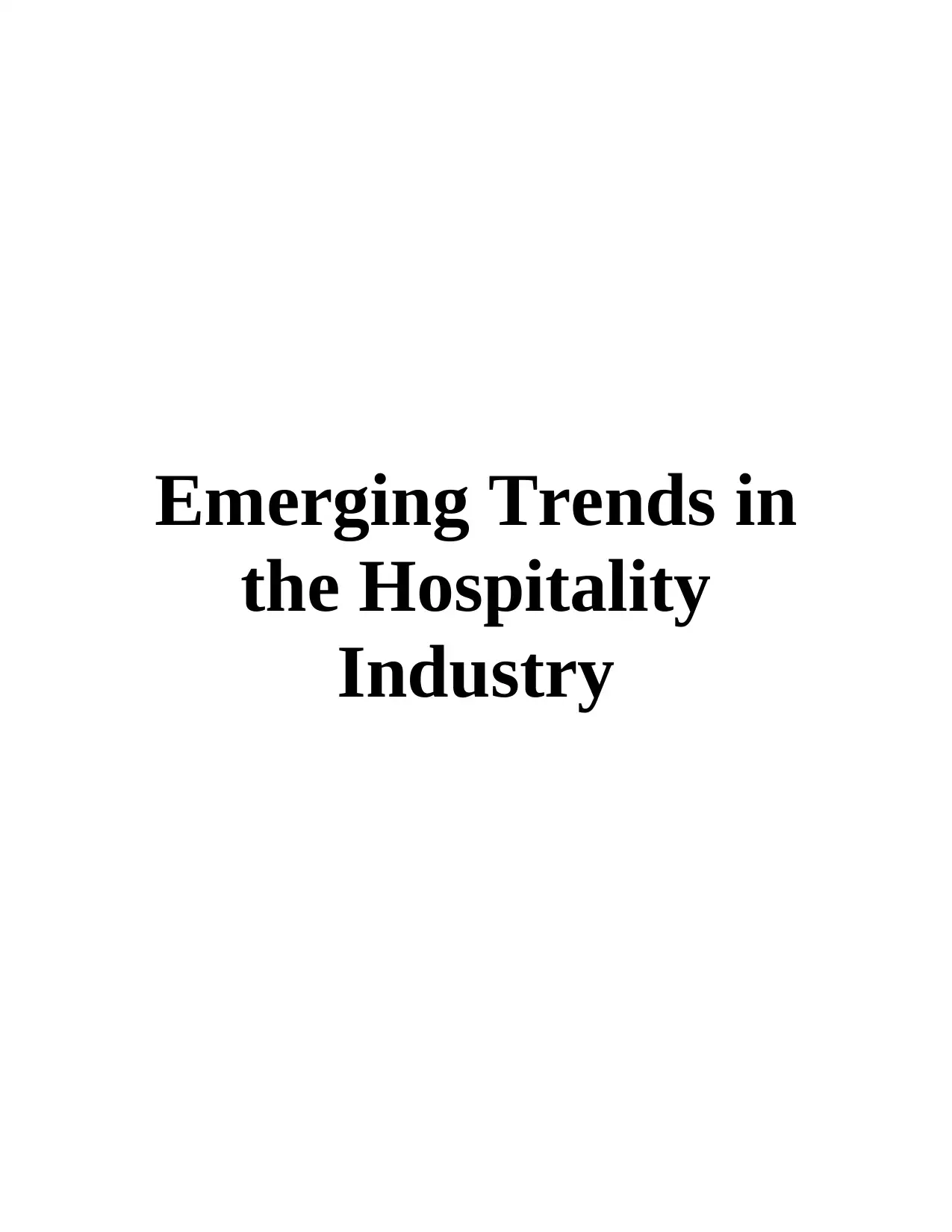
Emerging Trends in
the Hospitality
Industry
the Hospitality
Industry
Secure Best Marks with AI Grader
Need help grading? Try our AI Grader for instant feedback on your assignments.

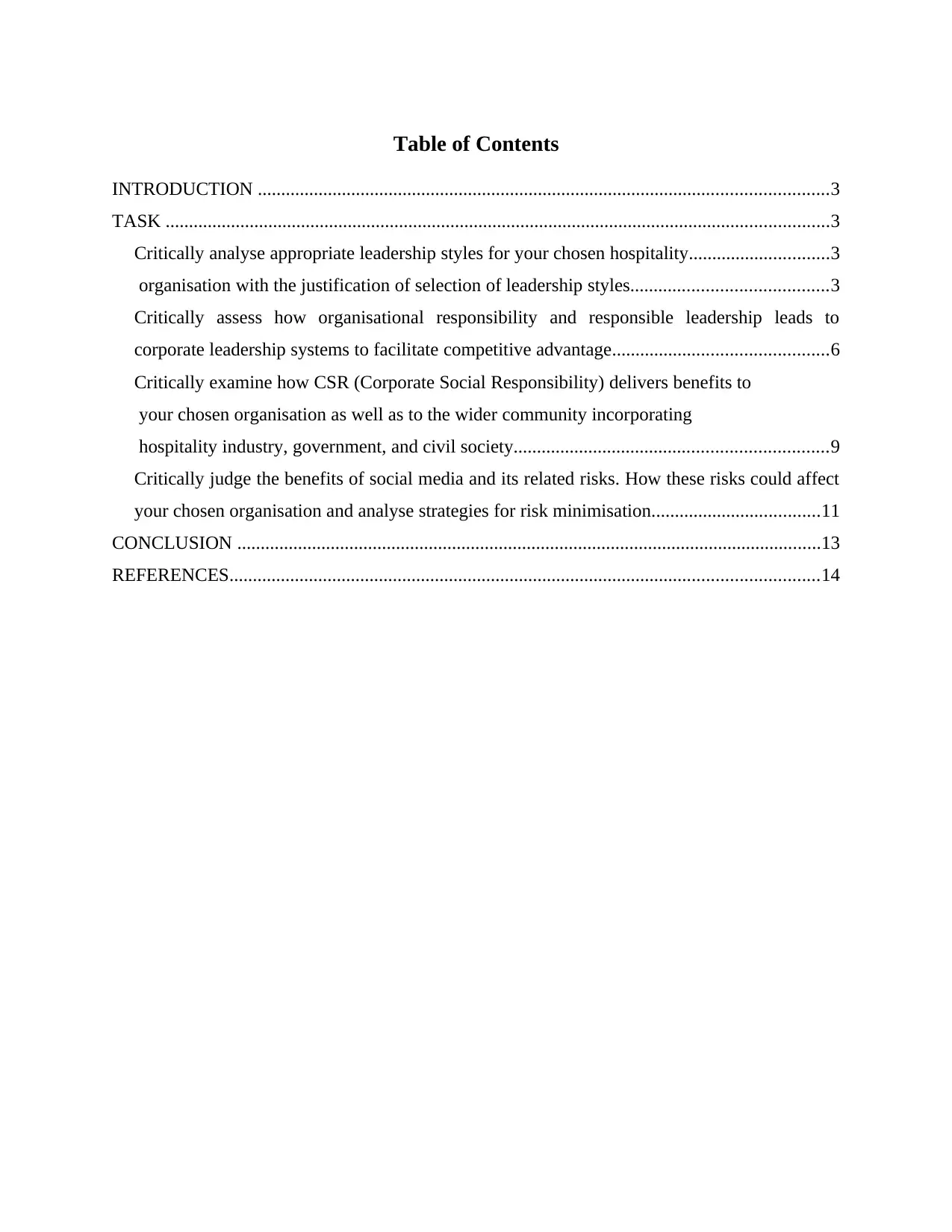
Table of Contents
INTRODUCTION ..........................................................................................................................3
TASK ..............................................................................................................................................3
Critically analyse appropriate leadership styles for your chosen hospitality..............................3
organisation with the justification of selection of leadership styles..........................................3
Critically assess how organisational responsibility and responsible leadership leads to
corporate leadership systems to facilitate competitive advantage..............................................6
Critically examine how CSR (Corporate Social Responsibility) delivers benefits to
your chosen organisation as well as to the wider community incorporating
hospitality industry, government, and civil society...................................................................9
Critically judge the benefits of social media and its related risks. How these risks could affect
your chosen organisation and analyse strategies for risk minimisation....................................11
CONCLUSION .............................................................................................................................13
REFERENCES..............................................................................................................................14
INTRODUCTION ..........................................................................................................................3
TASK ..............................................................................................................................................3
Critically analyse appropriate leadership styles for your chosen hospitality..............................3
organisation with the justification of selection of leadership styles..........................................3
Critically assess how organisational responsibility and responsible leadership leads to
corporate leadership systems to facilitate competitive advantage..............................................6
Critically examine how CSR (Corporate Social Responsibility) delivers benefits to
your chosen organisation as well as to the wider community incorporating
hospitality industry, government, and civil society...................................................................9
Critically judge the benefits of social media and its related risks. How these risks could affect
your chosen organisation and analyse strategies for risk minimisation....................................11
CONCLUSION .............................................................................................................................13
REFERENCES..............................................................................................................................14
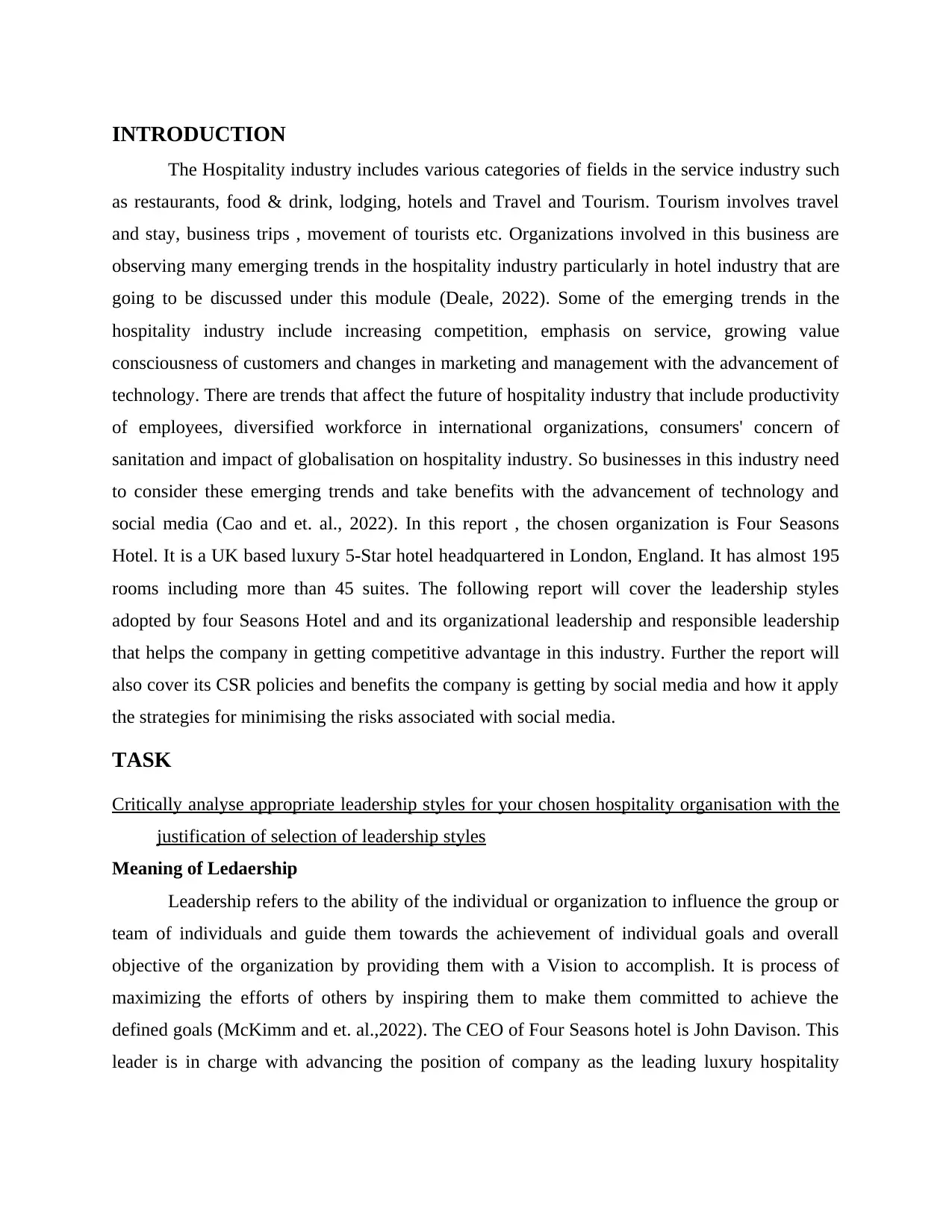
INTRODUCTION
The Hospitality industry includes various categories of fields in the service industry such
as restaurants, food & drink, lodging, hotels and Travel and Tourism. Tourism involves travel
and stay, business trips , movement of tourists etc. Organizations involved in this business are
observing many emerging trends in the hospitality industry particularly in hotel industry that are
going to be discussed under this module (Deale, 2022). Some of the emerging trends in the
hospitality industry include increasing competition, emphasis on service, growing value
consciousness of customers and changes in marketing and management with the advancement of
technology. There are trends that affect the future of hospitality industry that include productivity
of employees, diversified workforce in international organizations, consumers' concern of
sanitation and impact of globalisation on hospitality industry. So businesses in this industry need
to consider these emerging trends and take benefits with the advancement of technology and
social media (Cao and et. al., 2022). In this report , the chosen organization is Four Seasons
Hotel. It is a UK based luxury 5-Star hotel headquartered in London, England. It has almost 195
rooms including more than 45 suites. The following report will cover the leadership styles
adopted by four Seasons Hotel and and its organizational leadership and responsible leadership
that helps the company in getting competitive advantage in this industry. Further the report will
also cover its CSR policies and benefits the company is getting by social media and how it apply
the strategies for minimising the risks associated with social media.
TASK
Critically analyse appropriate leadership styles for your chosen hospitality organisation with the
justification of selection of leadership styles
Meaning of Ledaership
Leadership refers to the ability of the individual or organization to influence the group or
team of individuals and guide them towards the achievement of individual goals and overall
objective of the organization by providing them with a Vision to accomplish. It is process of
maximizing the efforts of others by inspiring them to make them committed to achieve the
defined goals (McKimm and et. al.,2022). The CEO of Four Seasons hotel is John Davison. This
leader is in charge with advancing the position of company as the leading luxury hospitality
The Hospitality industry includes various categories of fields in the service industry such
as restaurants, food & drink, lodging, hotels and Travel and Tourism. Tourism involves travel
and stay, business trips , movement of tourists etc. Organizations involved in this business are
observing many emerging trends in the hospitality industry particularly in hotel industry that are
going to be discussed under this module (Deale, 2022). Some of the emerging trends in the
hospitality industry include increasing competition, emphasis on service, growing value
consciousness of customers and changes in marketing and management with the advancement of
technology. There are trends that affect the future of hospitality industry that include productivity
of employees, diversified workforce in international organizations, consumers' concern of
sanitation and impact of globalisation on hospitality industry. So businesses in this industry need
to consider these emerging trends and take benefits with the advancement of technology and
social media (Cao and et. al., 2022). In this report , the chosen organization is Four Seasons
Hotel. It is a UK based luxury 5-Star hotel headquartered in London, England. It has almost 195
rooms including more than 45 suites. The following report will cover the leadership styles
adopted by four Seasons Hotel and and its organizational leadership and responsible leadership
that helps the company in getting competitive advantage in this industry. Further the report will
also cover its CSR policies and benefits the company is getting by social media and how it apply
the strategies for minimising the risks associated with social media.
TASK
Critically analyse appropriate leadership styles for your chosen hospitality organisation with the
justification of selection of leadership styles
Meaning of Ledaership
Leadership refers to the ability of the individual or organization to influence the group or
team of individuals and guide them towards the achievement of individual goals and overall
objective of the organization by providing them with a Vision to accomplish. It is process of
maximizing the efforts of others by inspiring them to make them committed to achieve the
defined goals (McKimm and et. al.,2022). The CEO of Four Seasons hotel is John Davison. This
leader is in charge with advancing the position of company as the leading luxury hospitality
Secure Best Marks with AI Grader
Need help grading? Try our AI Grader for instant feedback on your assignments.
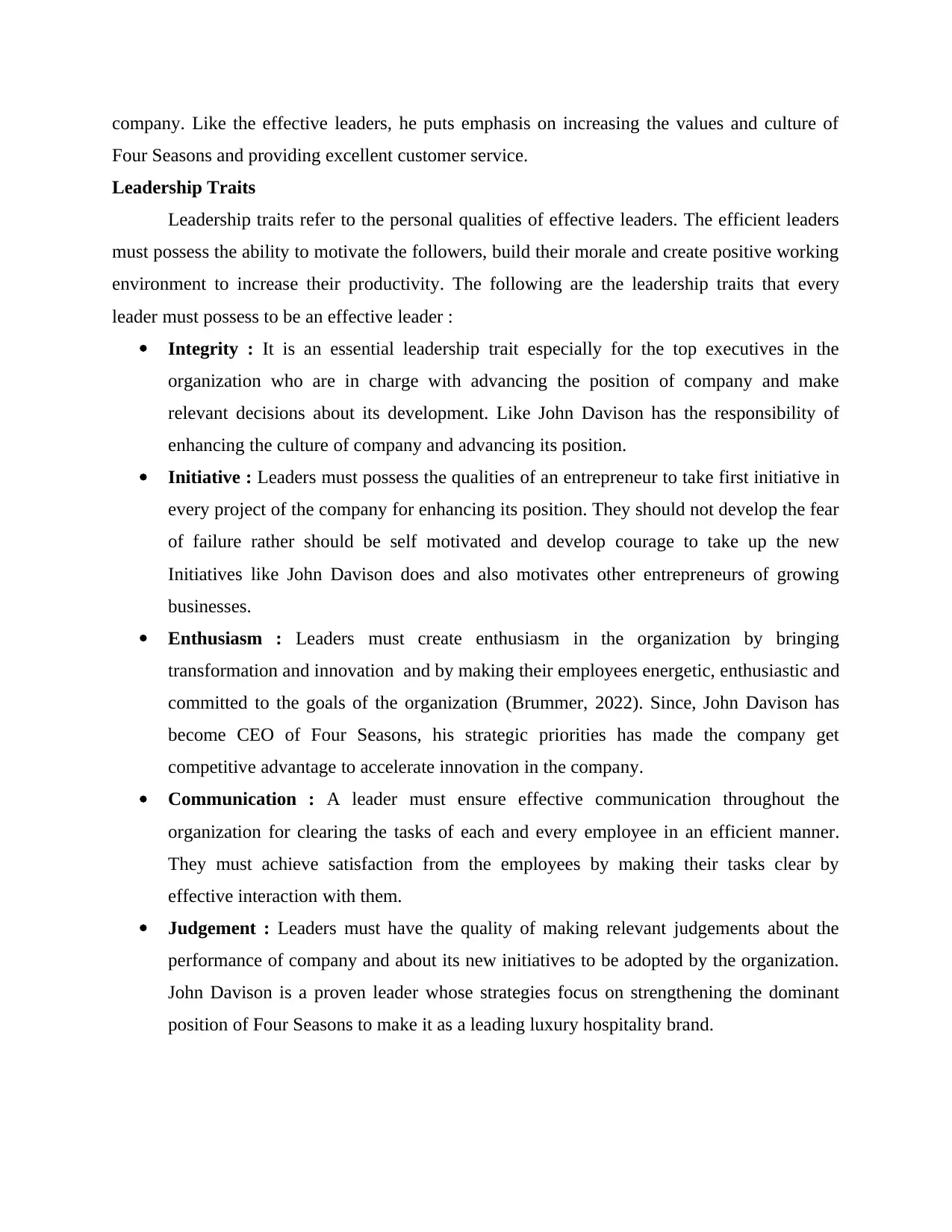
company. Like the effective leaders, he puts emphasis on increasing the values and culture of
Four Seasons and providing excellent customer service.
Leadership Traits
Leadership traits refer to the personal qualities of effective leaders. The efficient leaders
must possess the ability to motivate the followers, build their morale and create positive working
environment to increase their productivity. The following are the leadership traits that every
leader must possess to be an effective leader :
Integrity : It is an essential leadership trait especially for the top executives in the
organization who are in charge with advancing the position of company and make
relevant decisions about its development. Like John Davison has the responsibility of
enhancing the culture of company and advancing its position.
Initiative : Leaders must possess the qualities of an entrepreneur to take first initiative in
every project of the company for enhancing its position. They should not develop the fear
of failure rather should be self motivated and develop courage to take up the new
Initiatives like John Davison does and also motivates other entrepreneurs of growing
businesses.
Enthusiasm : Leaders must create enthusiasm in the organization by bringing
transformation and innovation and by making their employees energetic, enthusiastic and
committed to the goals of the organization (Brummer, 2022). Since, John Davison has
become CEO of Four Seasons, his strategic priorities has made the company get
competitive advantage to accelerate innovation in the company.
Communication : A leader must ensure effective communication throughout the
organization for clearing the tasks of each and every employee in an efficient manner.
They must achieve satisfaction from the employees by making their tasks clear by
effective interaction with them.
Judgement : Leaders must have the quality of making relevant judgements about the
performance of company and about its new initiatives to be adopted by the organization.
John Davison is a proven leader whose strategies focus on strengthening the dominant
position of Four Seasons to make it as a leading luxury hospitality brand.
Four Seasons and providing excellent customer service.
Leadership Traits
Leadership traits refer to the personal qualities of effective leaders. The efficient leaders
must possess the ability to motivate the followers, build their morale and create positive working
environment to increase their productivity. The following are the leadership traits that every
leader must possess to be an effective leader :
Integrity : It is an essential leadership trait especially for the top executives in the
organization who are in charge with advancing the position of company and make
relevant decisions about its development. Like John Davison has the responsibility of
enhancing the culture of company and advancing its position.
Initiative : Leaders must possess the qualities of an entrepreneur to take first initiative in
every project of the company for enhancing its position. They should not develop the fear
of failure rather should be self motivated and develop courage to take up the new
Initiatives like John Davison does and also motivates other entrepreneurs of growing
businesses.
Enthusiasm : Leaders must create enthusiasm in the organization by bringing
transformation and innovation and by making their employees energetic, enthusiastic and
committed to the goals of the organization (Brummer, 2022). Since, John Davison has
become CEO of Four Seasons, his strategic priorities has made the company get
competitive advantage to accelerate innovation in the company.
Communication : A leader must ensure effective communication throughout the
organization for clearing the tasks of each and every employee in an efficient manner.
They must achieve satisfaction from the employees by making their tasks clear by
effective interaction with them.
Judgement : Leaders must have the quality of making relevant judgements about the
performance of company and about its new initiatives to be adopted by the organization.
John Davison is a proven leader whose strategies focus on strengthening the dominant
position of Four Seasons to make it as a leading luxury hospitality brand.
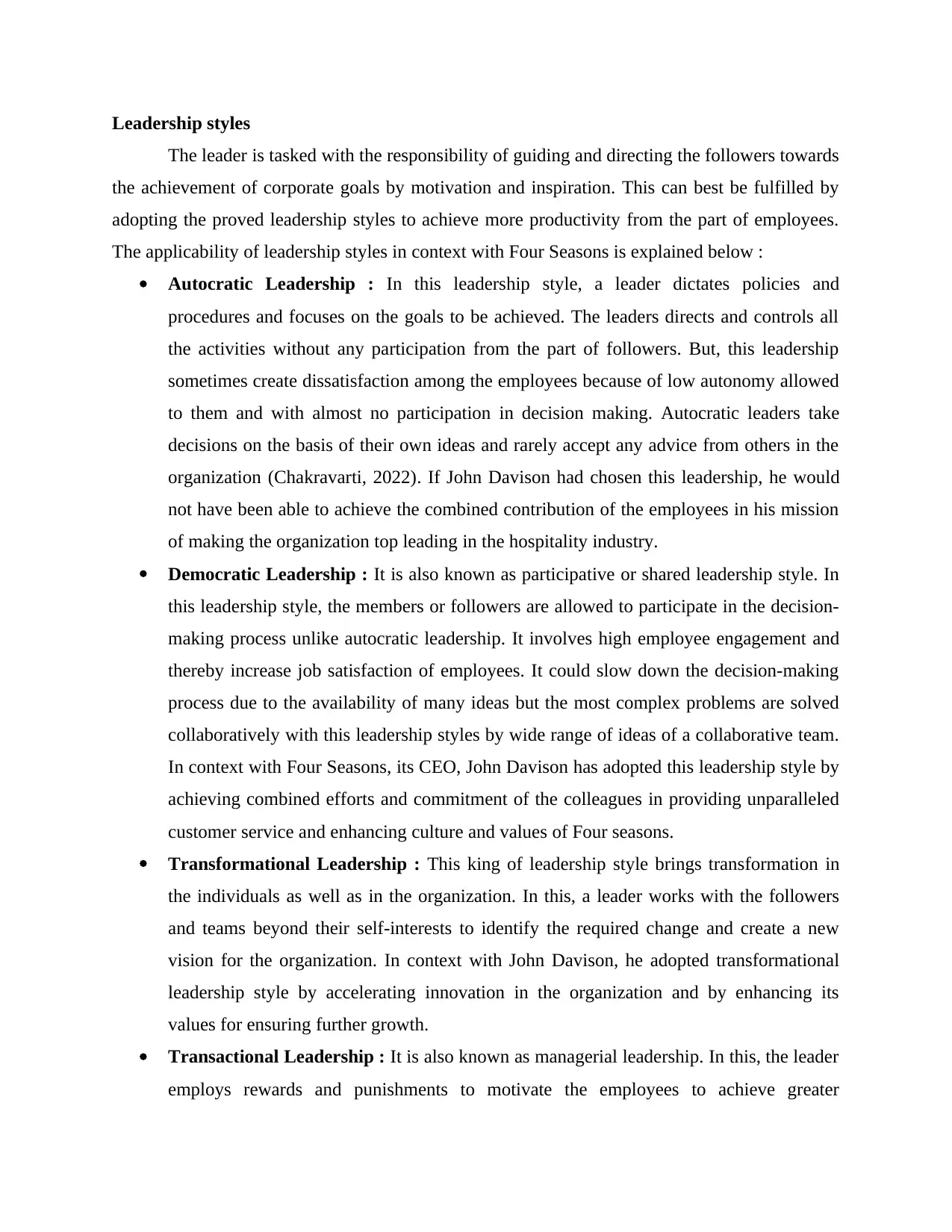
Leadership styles
The leader is tasked with the responsibility of guiding and directing the followers towards
the achievement of corporate goals by motivation and inspiration. This can best be fulfilled by
adopting the proved leadership styles to achieve more productivity from the part of employees.
The applicability of leadership styles in context with Four Seasons is explained below :
Autocratic Leadership : In this leadership style, a leader dictates policies and
procedures and focuses on the goals to be achieved. The leaders directs and controls all
the activities without any participation from the part of followers. But, this leadership
sometimes create dissatisfaction among the employees because of low autonomy allowed
to them and with almost no participation in decision making. Autocratic leaders take
decisions on the basis of their own ideas and rarely accept any advice from others in the
organization (Chakravarti, 2022). If John Davison had chosen this leadership, he would
not have been able to achieve the combined contribution of the employees in his mission
of making the organization top leading in the hospitality industry.
Democratic Leadership : It is also known as participative or shared leadership style. In
this leadership style, the members or followers are allowed to participate in the decision-
making process unlike autocratic leadership. It involves high employee engagement and
thereby increase job satisfaction of employees. It could slow down the decision-making
process due to the availability of many ideas but the most complex problems are solved
collaboratively with this leadership styles by wide range of ideas of a collaborative team.
In context with Four Seasons, its CEO, John Davison has adopted this leadership style by
achieving combined efforts and commitment of the colleagues in providing unparalleled
customer service and enhancing culture and values of Four seasons.
Transformational Leadership : This king of leadership style brings transformation in
the individuals as well as in the organization. In this, a leader works with the followers
and teams beyond their self-interests to identify the required change and create a new
vision for the organization. In context with John Davison, he adopted transformational
leadership style by accelerating innovation in the organization and by enhancing its
values for ensuring further growth.
Transactional Leadership : It is also known as managerial leadership. In this, the leader
employs rewards and punishments to motivate the employees to achieve greater
The leader is tasked with the responsibility of guiding and directing the followers towards
the achievement of corporate goals by motivation and inspiration. This can best be fulfilled by
adopting the proved leadership styles to achieve more productivity from the part of employees.
The applicability of leadership styles in context with Four Seasons is explained below :
Autocratic Leadership : In this leadership style, a leader dictates policies and
procedures and focuses on the goals to be achieved. The leaders directs and controls all
the activities without any participation from the part of followers. But, this leadership
sometimes create dissatisfaction among the employees because of low autonomy allowed
to them and with almost no participation in decision making. Autocratic leaders take
decisions on the basis of their own ideas and rarely accept any advice from others in the
organization (Chakravarti, 2022). If John Davison had chosen this leadership, he would
not have been able to achieve the combined contribution of the employees in his mission
of making the organization top leading in the hospitality industry.
Democratic Leadership : It is also known as participative or shared leadership style. In
this leadership style, the members or followers are allowed to participate in the decision-
making process unlike autocratic leadership. It involves high employee engagement and
thereby increase job satisfaction of employees. It could slow down the decision-making
process due to the availability of many ideas but the most complex problems are solved
collaboratively with this leadership styles by wide range of ideas of a collaborative team.
In context with Four Seasons, its CEO, John Davison has adopted this leadership style by
achieving combined efforts and commitment of the colleagues in providing unparalleled
customer service and enhancing culture and values of Four seasons.
Transformational Leadership : This king of leadership style brings transformation in
the individuals as well as in the organization. In this, a leader works with the followers
and teams beyond their self-interests to identify the required change and create a new
vision for the organization. In context with John Davison, he adopted transformational
leadership style by accelerating innovation in the organization and by enhancing its
values for ensuring further growth.
Transactional Leadership : It is also known as managerial leadership. In this, the leader
employs rewards and punishments to motivate the employees to achieve greater
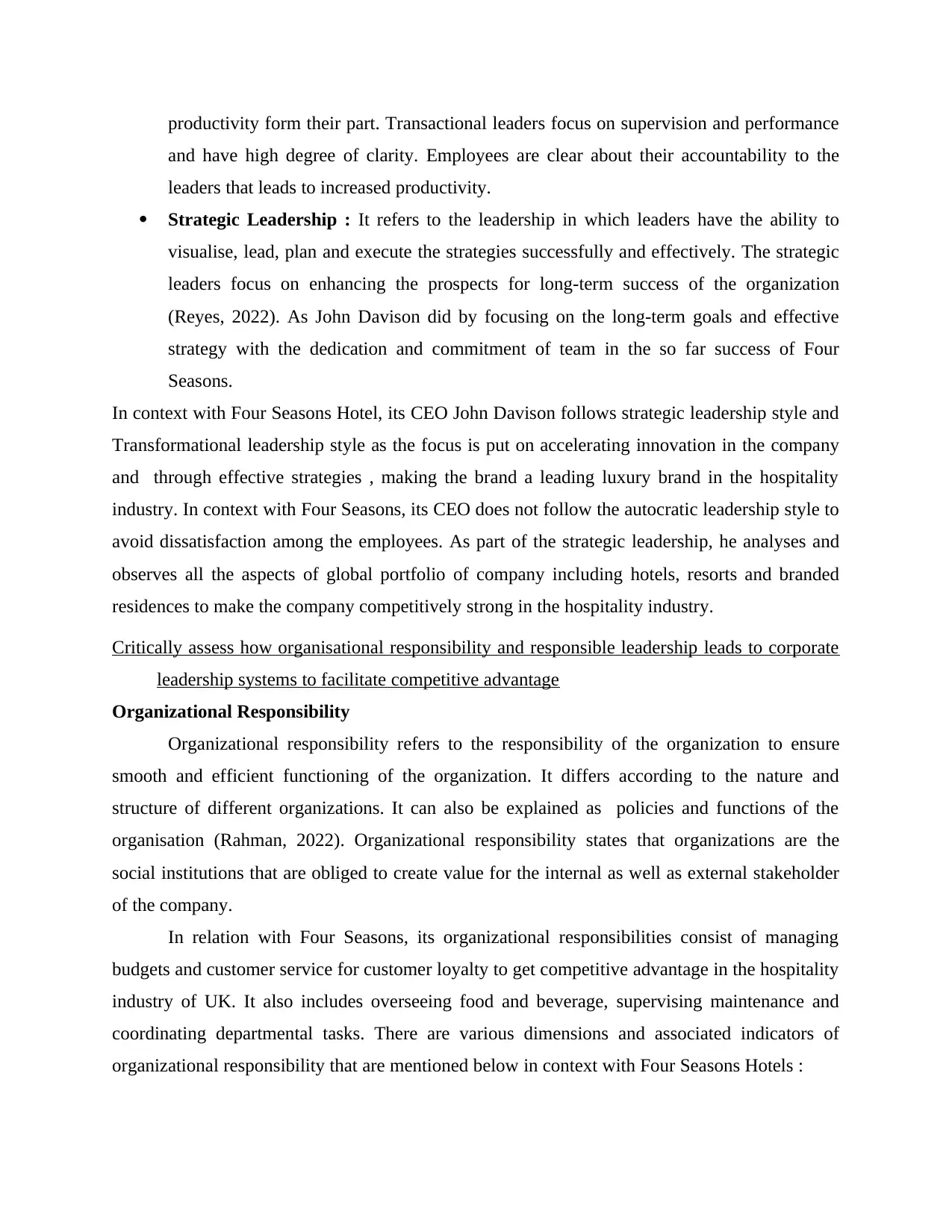
productivity form their part. Transactional leaders focus on supervision and performance
and have high degree of clarity. Employees are clear about their accountability to the
leaders that leads to increased productivity.
Strategic Leadership : It refers to the leadership in which leaders have the ability to
visualise, lead, plan and execute the strategies successfully and effectively. The strategic
leaders focus on enhancing the prospects for long-term success of the organization
(Reyes, 2022). As John Davison did by focusing on the long-term goals and effective
strategy with the dedication and commitment of team in the so far success of Four
Seasons.
In context with Four Seasons Hotel, its CEO John Davison follows strategic leadership style and
Transformational leadership style as the focus is put on accelerating innovation in the company
and through effective strategies , making the brand a leading luxury brand in the hospitality
industry. In context with Four Seasons, its CEO does not follow the autocratic leadership style to
avoid dissatisfaction among the employees. As part of the strategic leadership, he analyses and
observes all the aspects of global portfolio of company including hotels, resorts and branded
residences to make the company competitively strong in the hospitality industry.
Critically assess how organisational responsibility and responsible leadership leads to corporate
leadership systems to facilitate competitive advantage
Organizational Responsibility
Organizational responsibility refers to the responsibility of the organization to ensure
smooth and efficient functioning of the organization. It differs according to the nature and
structure of different organizations. It can also be explained as policies and functions of the
organisation (Rahman, 2022). Organizational responsibility states that organizations are the
social institutions that are obliged to create value for the internal as well as external stakeholder
of the company.
In relation with Four Seasons, its organizational responsibilities consist of managing
budgets and customer service for customer loyalty to get competitive advantage in the hospitality
industry of UK. It also includes overseeing food and beverage, supervising maintenance and
coordinating departmental tasks. There are various dimensions and associated indicators of
organizational responsibility that are mentioned below in context with Four Seasons Hotels :
and have high degree of clarity. Employees are clear about their accountability to the
leaders that leads to increased productivity.
Strategic Leadership : It refers to the leadership in which leaders have the ability to
visualise, lead, plan and execute the strategies successfully and effectively. The strategic
leaders focus on enhancing the prospects for long-term success of the organization
(Reyes, 2022). As John Davison did by focusing on the long-term goals and effective
strategy with the dedication and commitment of team in the so far success of Four
Seasons.
In context with Four Seasons Hotel, its CEO John Davison follows strategic leadership style and
Transformational leadership style as the focus is put on accelerating innovation in the company
and through effective strategies , making the brand a leading luxury brand in the hospitality
industry. In context with Four Seasons, its CEO does not follow the autocratic leadership style to
avoid dissatisfaction among the employees. As part of the strategic leadership, he analyses and
observes all the aspects of global portfolio of company including hotels, resorts and branded
residences to make the company competitively strong in the hospitality industry.
Critically assess how organisational responsibility and responsible leadership leads to corporate
leadership systems to facilitate competitive advantage
Organizational Responsibility
Organizational responsibility refers to the responsibility of the organization to ensure
smooth and efficient functioning of the organization. It differs according to the nature and
structure of different organizations. It can also be explained as policies and functions of the
organisation (Rahman, 2022). Organizational responsibility states that organizations are the
social institutions that are obliged to create value for the internal as well as external stakeholder
of the company.
In relation with Four Seasons, its organizational responsibilities consist of managing
budgets and customer service for customer loyalty to get competitive advantage in the hospitality
industry of UK. It also includes overseeing food and beverage, supervising maintenance and
coordinating departmental tasks. There are various dimensions and associated indicators of
organizational responsibility that are mentioned below in context with Four Seasons Hotels :
Paraphrase This Document
Need a fresh take? Get an instant paraphrase of this document with our AI Paraphraser
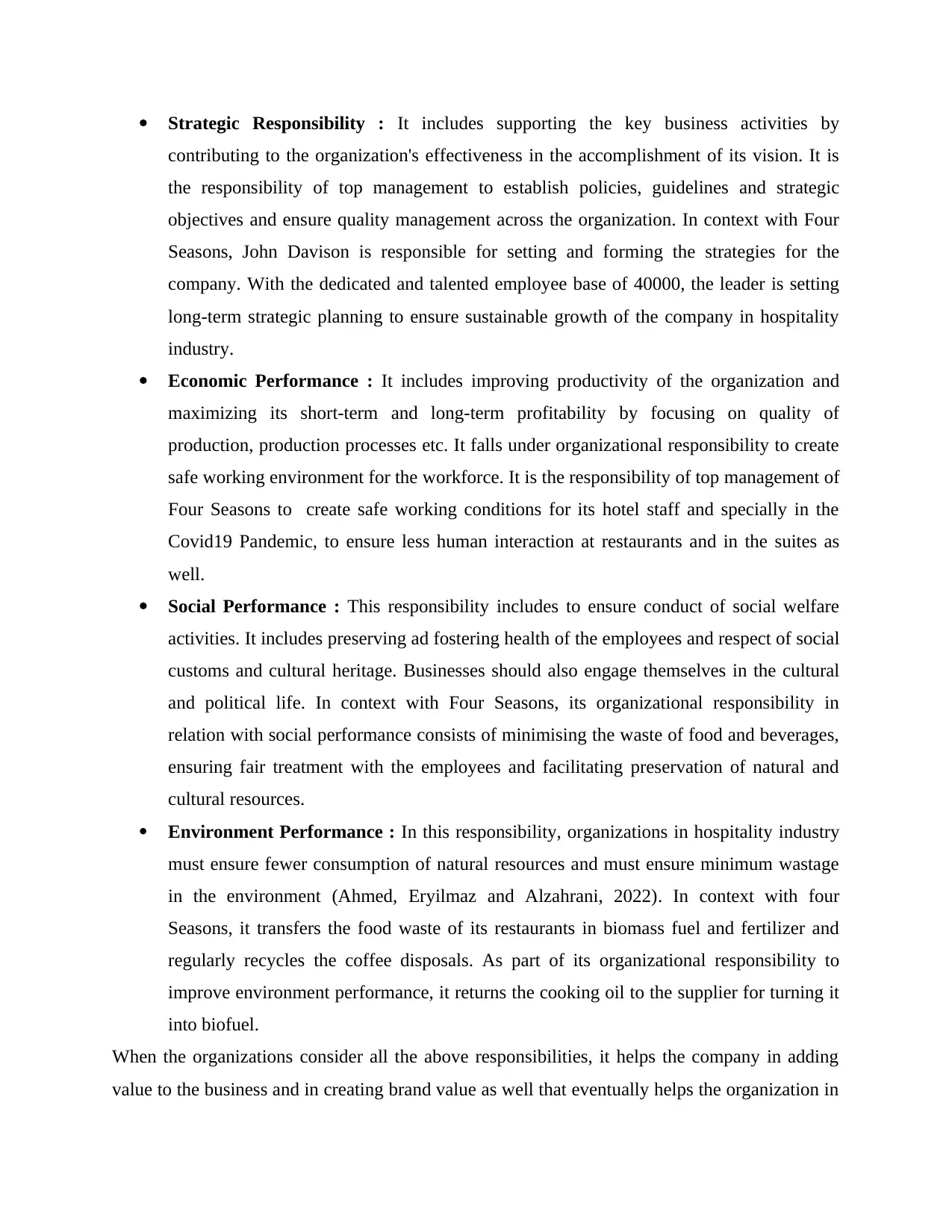
Strategic Responsibility : It includes supporting the key business activities by
contributing to the organization's effectiveness in the accomplishment of its vision. It is
the responsibility of top management to establish policies, guidelines and strategic
objectives and ensure quality management across the organization. In context with Four
Seasons, John Davison is responsible for setting and forming the strategies for the
company. With the dedicated and talented employee base of 40000, the leader is setting
long-term strategic planning to ensure sustainable growth of the company in hospitality
industry.
Economic Performance : It includes improving productivity of the organization and
maximizing its short-term and long-term profitability by focusing on quality of
production, production processes etc. It falls under organizational responsibility to create
safe working environment for the workforce. It is the responsibility of top management of
Four Seasons to create safe working conditions for its hotel staff and specially in the
Covid19 Pandemic, to ensure less human interaction at restaurants and in the suites as
well.
Social Performance : This responsibility includes to ensure conduct of social welfare
activities. It includes preserving ad fostering health of the employees and respect of social
customs and cultural heritage. Businesses should also engage themselves in the cultural
and political life. In context with Four Seasons, its organizational responsibility in
relation with social performance consists of minimising the waste of food and beverages,
ensuring fair treatment with the employees and facilitating preservation of natural and
cultural resources.
Environment Performance : In this responsibility, organizations in hospitality industry
must ensure fewer consumption of natural resources and must ensure minimum wastage
in the environment (Ahmed, Eryilmaz and Alzahrani, 2022). In context with four
Seasons, it transfers the food waste of its restaurants in biomass fuel and fertilizer and
regularly recycles the coffee disposals. As part of its organizational responsibility to
improve environment performance, it returns the cooking oil to the supplier for turning it
into biofuel.
When the organizations consider all the above responsibilities, it helps the company in adding
value to the business and in creating brand value as well that eventually helps the organization in
contributing to the organization's effectiveness in the accomplishment of its vision. It is
the responsibility of top management to establish policies, guidelines and strategic
objectives and ensure quality management across the organization. In context with Four
Seasons, John Davison is responsible for setting and forming the strategies for the
company. With the dedicated and talented employee base of 40000, the leader is setting
long-term strategic planning to ensure sustainable growth of the company in hospitality
industry.
Economic Performance : It includes improving productivity of the organization and
maximizing its short-term and long-term profitability by focusing on quality of
production, production processes etc. It falls under organizational responsibility to create
safe working environment for the workforce. It is the responsibility of top management of
Four Seasons to create safe working conditions for its hotel staff and specially in the
Covid19 Pandemic, to ensure less human interaction at restaurants and in the suites as
well.
Social Performance : This responsibility includes to ensure conduct of social welfare
activities. It includes preserving ad fostering health of the employees and respect of social
customs and cultural heritage. Businesses should also engage themselves in the cultural
and political life. In context with Four Seasons, its organizational responsibility in
relation with social performance consists of minimising the waste of food and beverages,
ensuring fair treatment with the employees and facilitating preservation of natural and
cultural resources.
Environment Performance : In this responsibility, organizations in hospitality industry
must ensure fewer consumption of natural resources and must ensure minimum wastage
in the environment (Ahmed, Eryilmaz and Alzahrani, 2022). In context with four
Seasons, it transfers the food waste of its restaurants in biomass fuel and fertilizer and
regularly recycles the coffee disposals. As part of its organizational responsibility to
improve environment performance, it returns the cooking oil to the supplier for turning it
into biofuel.
When the organizations consider all the above responsibilities, it helps the company in adding
value to the business and in creating brand value as well that eventually helps the organization in
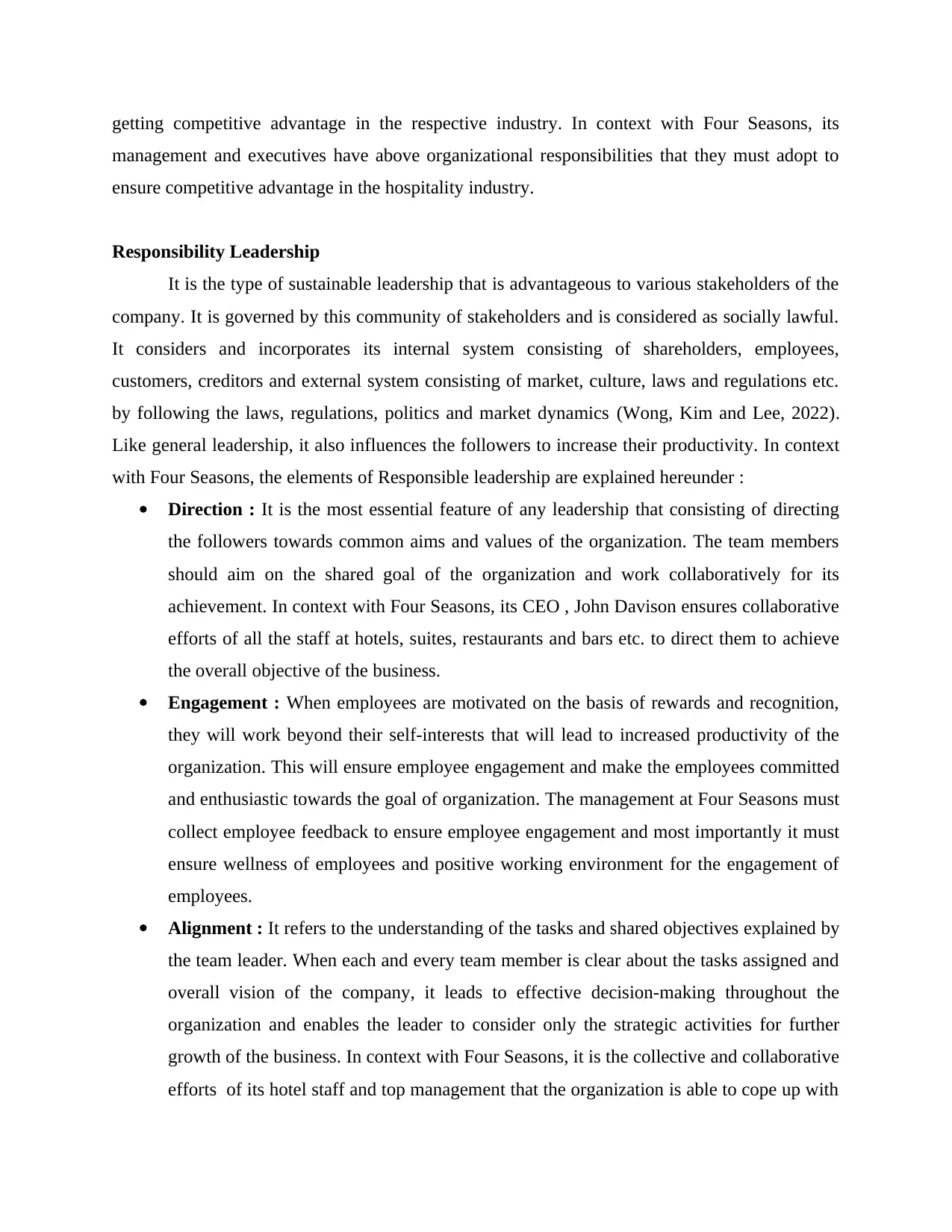
getting competitive advantage in the respective industry. In context with Four Seasons, its
management and executives have above organizational responsibilities that they must adopt to
ensure competitive advantage in the hospitality industry.
Responsibility Leadership
It is the type of sustainable leadership that is advantageous to various stakeholders of the
company. It is governed by this community of stakeholders and is considered as socially lawful.
It considers and incorporates its internal system consisting of shareholders, employees,
customers, creditors and external system consisting of market, culture, laws and regulations etc.
by following the laws, regulations, politics and market dynamics (Wong, Kim and Lee, 2022).
Like general leadership, it also influences the followers to increase their productivity. In context
with Four Seasons, the elements of Responsible leadership are explained hereunder :
Direction : It is the most essential feature of any leadership that consisting of directing
the followers towards common aims and values of the organization. The team members
should aim on the shared goal of the organization and work collaboratively for its
achievement. In context with Four Seasons, its CEO , John Davison ensures collaborative
efforts of all the staff at hotels, suites, restaurants and bars etc. to direct them to achieve
the overall objective of the business.
Engagement : When employees are motivated on the basis of rewards and recognition,
they will work beyond their self-interests that will lead to increased productivity of the
organization. This will ensure employee engagement and make the employees committed
and enthusiastic towards the goal of organization. The management at Four Seasons must
collect employee feedback to ensure employee engagement and most importantly it must
ensure wellness of employees and positive working environment for the engagement of
employees.
Alignment : It refers to the understanding of the tasks and shared objectives explained by
the team leader. When each and every team member is clear about the tasks assigned and
overall vision of the company, it leads to effective decision-making throughout the
organization and enables the leader to consider only the strategic activities for further
growth of the business. In context with Four Seasons, it is the collective and collaborative
efforts of its hotel staff and top management that the organization is able to cope up with
management and executives have above organizational responsibilities that they must adopt to
ensure competitive advantage in the hospitality industry.
Responsibility Leadership
It is the type of sustainable leadership that is advantageous to various stakeholders of the
company. It is governed by this community of stakeholders and is considered as socially lawful.
It considers and incorporates its internal system consisting of shareholders, employees,
customers, creditors and external system consisting of market, culture, laws and regulations etc.
by following the laws, regulations, politics and market dynamics (Wong, Kim and Lee, 2022).
Like general leadership, it also influences the followers to increase their productivity. In context
with Four Seasons, the elements of Responsible leadership are explained hereunder :
Direction : It is the most essential feature of any leadership that consisting of directing
the followers towards common aims and values of the organization. The team members
should aim on the shared goal of the organization and work collaboratively for its
achievement. In context with Four Seasons, its CEO , John Davison ensures collaborative
efforts of all the staff at hotels, suites, restaurants and bars etc. to direct them to achieve
the overall objective of the business.
Engagement : When employees are motivated on the basis of rewards and recognition,
they will work beyond their self-interests that will lead to increased productivity of the
organization. This will ensure employee engagement and make the employees committed
and enthusiastic towards the goal of organization. The management at Four Seasons must
collect employee feedback to ensure employee engagement and most importantly it must
ensure wellness of employees and positive working environment for the engagement of
employees.
Alignment : It refers to the understanding of the tasks and shared objectives explained by
the team leader. When each and every team member is clear about the tasks assigned and
overall vision of the company, it leads to effective decision-making throughout the
organization and enables the leader to consider only the strategic activities for further
growth of the business. In context with Four Seasons, it is the collective and collaborative
efforts of its hotel staff and top management that the organization is able to cope up with
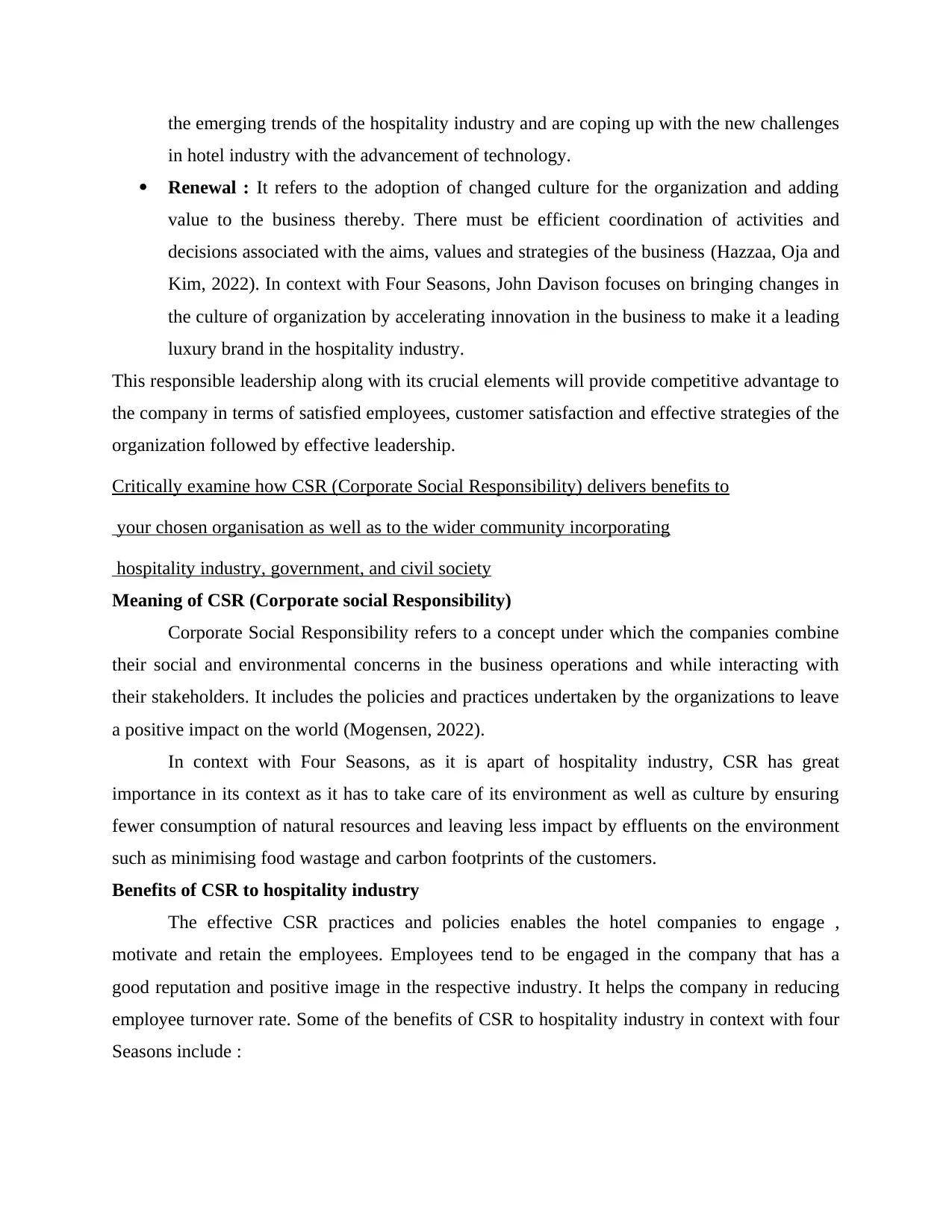
the emerging trends of the hospitality industry and are coping up with the new challenges
in hotel industry with the advancement of technology.
Renewal : It refers to the adoption of changed culture for the organization and adding
value to the business thereby. There must be efficient coordination of activities and
decisions associated with the aims, values and strategies of the business (Hazzaa, Oja and
Kim, 2022). In context with Four Seasons, John Davison focuses on bringing changes in
the culture of organization by accelerating innovation in the business to make it a leading
luxury brand in the hospitality industry.
This responsible leadership along with its crucial elements will provide competitive advantage to
the company in terms of satisfied employees, customer satisfaction and effective strategies of the
organization followed by effective leadership.
Critically examine how CSR (Corporate Social Responsibility) delivers benefits to
your chosen organisation as well as to the wider community incorporating
hospitality industry, government, and civil society
Meaning of CSR (Corporate social Responsibility)
Corporate Social Responsibility refers to a concept under which the companies combine
their social and environmental concerns in the business operations and while interacting with
their stakeholders. It includes the policies and practices undertaken by the organizations to leave
a positive impact on the world (Mogensen, 2022).
In context with Four Seasons, as it is apart of hospitality industry, CSR has great
importance in its context as it has to take care of its environment as well as culture by ensuring
fewer consumption of natural resources and leaving less impact by effluents on the environment
such as minimising food wastage and carbon footprints of the customers.
Benefits of CSR to hospitality industry
The effective CSR practices and policies enables the hotel companies to engage ,
motivate and retain the employees. Employees tend to be engaged in the company that has a
good reputation and positive image in the respective industry. It helps the company in reducing
employee turnover rate. Some of the benefits of CSR to hospitality industry in context with four
Seasons include :
in hotel industry with the advancement of technology.
Renewal : It refers to the adoption of changed culture for the organization and adding
value to the business thereby. There must be efficient coordination of activities and
decisions associated with the aims, values and strategies of the business (Hazzaa, Oja and
Kim, 2022). In context with Four Seasons, John Davison focuses on bringing changes in
the culture of organization by accelerating innovation in the business to make it a leading
luxury brand in the hospitality industry.
This responsible leadership along with its crucial elements will provide competitive advantage to
the company in terms of satisfied employees, customer satisfaction and effective strategies of the
organization followed by effective leadership.
Critically examine how CSR (Corporate Social Responsibility) delivers benefits to
your chosen organisation as well as to the wider community incorporating
hospitality industry, government, and civil society
Meaning of CSR (Corporate social Responsibility)
Corporate Social Responsibility refers to a concept under which the companies combine
their social and environmental concerns in the business operations and while interacting with
their stakeholders. It includes the policies and practices undertaken by the organizations to leave
a positive impact on the world (Mogensen, 2022).
In context with Four Seasons, as it is apart of hospitality industry, CSR has great
importance in its context as it has to take care of its environment as well as culture by ensuring
fewer consumption of natural resources and leaving less impact by effluents on the environment
such as minimising food wastage and carbon footprints of the customers.
Benefits of CSR to hospitality industry
The effective CSR practices and policies enables the hotel companies to engage ,
motivate and retain the employees. Employees tend to be engaged in the company that has a
good reputation and positive image in the respective industry. It helps the company in reducing
employee turnover rate. Some of the benefits of CSR to hospitality industry in context with four
Seasons include :
Secure Best Marks with AI Grader
Need help grading? Try our AI Grader for instant feedback on your assignments.
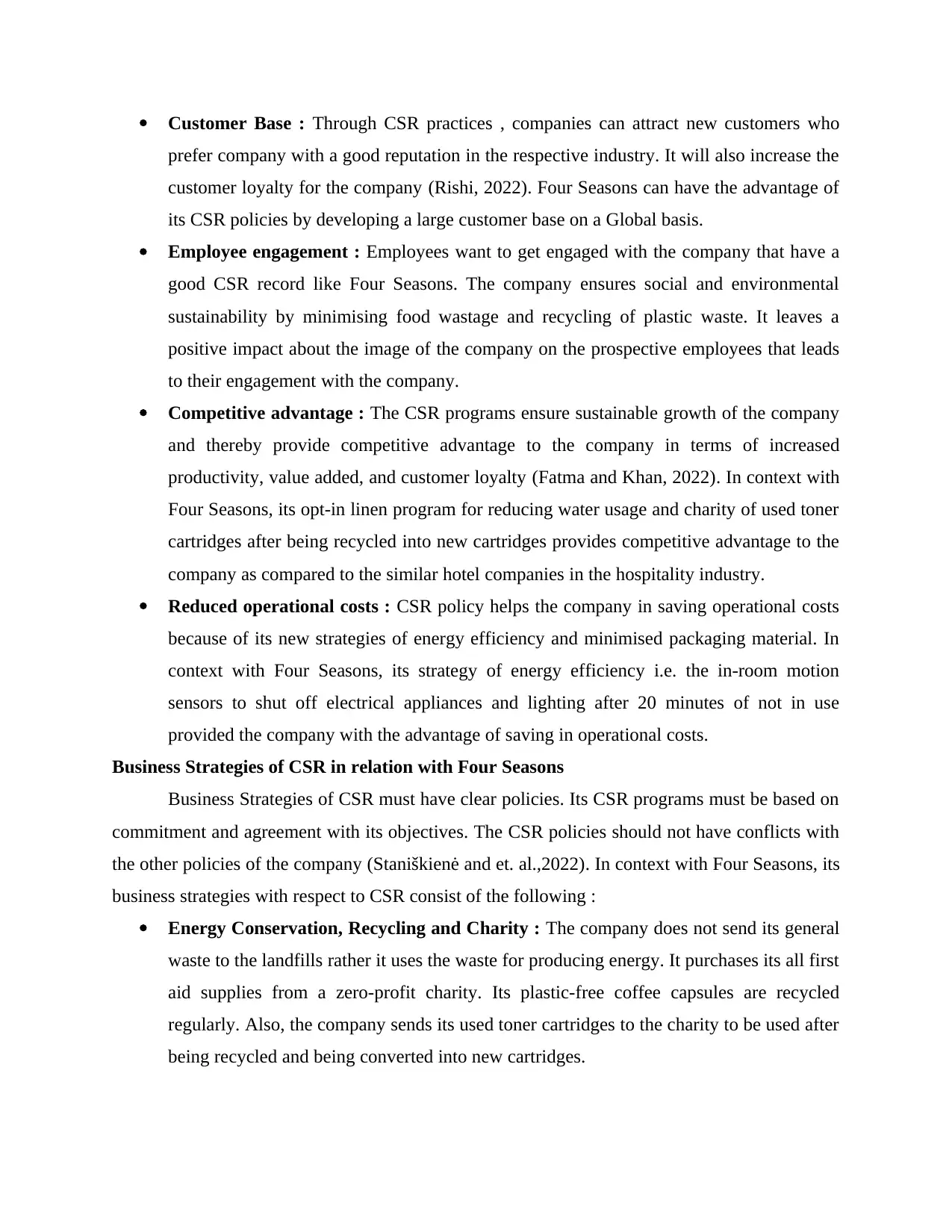
Customer Base : Through CSR practices , companies can attract new customers who
prefer company with a good reputation in the respective industry. It will also increase the
customer loyalty for the company (Rishi, 2022). Four Seasons can have the advantage of
its CSR policies by developing a large customer base on a Global basis.
Employee engagement : Employees want to get engaged with the company that have a
good CSR record like Four Seasons. The company ensures social and environmental
sustainability by minimising food wastage and recycling of plastic waste. It leaves a
positive impact about the image of the company on the prospective employees that leads
to their engagement with the company.
Competitive advantage : The CSR programs ensure sustainable growth of the company
and thereby provide competitive advantage to the company in terms of increased
productivity, value added, and customer loyalty (Fatma and Khan, 2022). In context with
Four Seasons, its opt-in linen program for reducing water usage and charity of used toner
cartridges after being recycled into new cartridges provides competitive advantage to the
company as compared to the similar hotel companies in the hospitality industry.
Reduced operational costs : CSR policy helps the company in saving operational costs
because of its new strategies of energy efficiency and minimised packaging material. In
context with Four Seasons, its strategy of energy efficiency i.e. the in-room motion
sensors to shut off electrical appliances and lighting after 20 minutes of not in use
provided the company with the advantage of saving in operational costs.
Business Strategies of CSR in relation with Four Seasons
Business Strategies of CSR must have clear policies. Its CSR programs must be based on
commitment and agreement with its objectives. The CSR policies should not have conflicts with
the other policies of the company (Staniškienė and et. al.,2022). In context with Four Seasons, its
business strategies with respect to CSR consist of the following :
Energy Conservation, Recycling and Charity : The company does not send its general
waste to the landfills rather it uses the waste for producing energy. It purchases its all first
aid supplies from a zero-profit charity. Its plastic-free coffee capsules are recycled
regularly. Also, the company sends its used toner cartridges to the charity to be used after
being recycled and being converted into new cartridges.
prefer company with a good reputation in the respective industry. It will also increase the
customer loyalty for the company (Rishi, 2022). Four Seasons can have the advantage of
its CSR policies by developing a large customer base on a Global basis.
Employee engagement : Employees want to get engaged with the company that have a
good CSR record like Four Seasons. The company ensures social and environmental
sustainability by minimising food wastage and recycling of plastic waste. It leaves a
positive impact about the image of the company on the prospective employees that leads
to their engagement with the company.
Competitive advantage : The CSR programs ensure sustainable growth of the company
and thereby provide competitive advantage to the company in terms of increased
productivity, value added, and customer loyalty (Fatma and Khan, 2022). In context with
Four Seasons, its opt-in linen program for reducing water usage and charity of used toner
cartridges after being recycled into new cartridges provides competitive advantage to the
company as compared to the similar hotel companies in the hospitality industry.
Reduced operational costs : CSR policy helps the company in saving operational costs
because of its new strategies of energy efficiency and minimised packaging material. In
context with Four Seasons, its strategy of energy efficiency i.e. the in-room motion
sensors to shut off electrical appliances and lighting after 20 minutes of not in use
provided the company with the advantage of saving in operational costs.
Business Strategies of CSR in relation with Four Seasons
Business Strategies of CSR must have clear policies. Its CSR programs must be based on
commitment and agreement with its objectives. The CSR policies should not have conflicts with
the other policies of the company (Staniškienė and et. al.,2022). In context with Four Seasons, its
business strategies with respect to CSR consist of the following :
Energy Conservation, Recycling and Charity : The company does not send its general
waste to the landfills rather it uses the waste for producing energy. It purchases its all first
aid supplies from a zero-profit charity. Its plastic-free coffee capsules are recycled
regularly. Also, the company sends its used toner cartridges to the charity to be used after
being recycled and being converted into new cartridges.
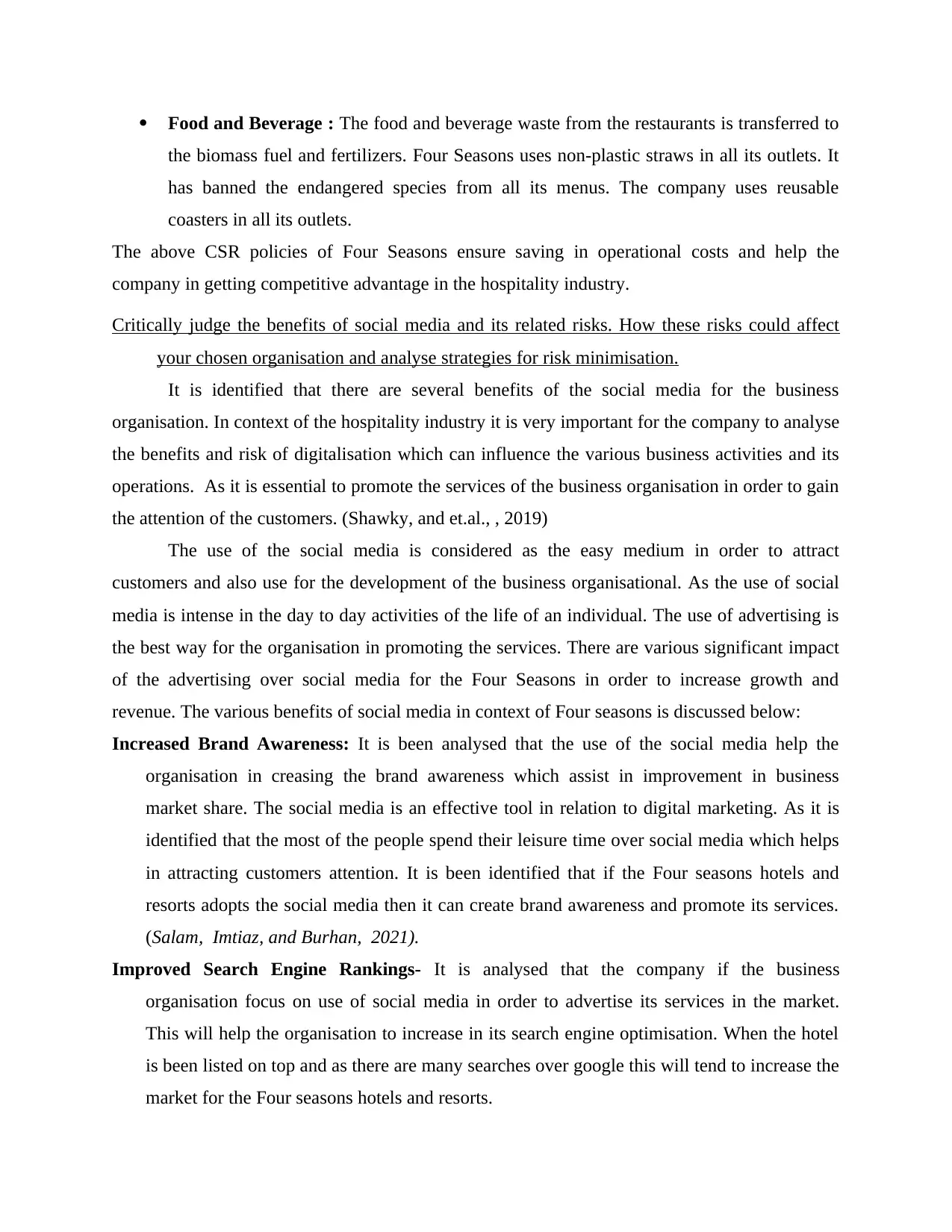
Food and Beverage : The food and beverage waste from the restaurants is transferred to
the biomass fuel and fertilizers. Four Seasons uses non-plastic straws in all its outlets. It
has banned the endangered species from all its menus. The company uses reusable
coasters in all its outlets.
The above CSR policies of Four Seasons ensure saving in operational costs and help the
company in getting competitive advantage in the hospitality industry.
Critically judge the benefits of social media and its related risks. How these risks could affect
your chosen organisation and analyse strategies for risk minimisation.
It is identified that there are several benefits of the social media for the business
organisation. In context of the hospitality industry it is very important for the company to analyse
the benefits and risk of digitalisation which can influence the various business activities and its
operations. As it is essential to promote the services of the business organisation in order to gain
the attention of the customers. (Shawky, and et.al., , 2019)
The use of the social media is considered as the easy medium in order to attract
customers and also use for the development of the business organisational. As the use of social
media is intense in the day to day activities of the life of an individual. The use of advertising is
the best way for the organisation in promoting the services. There are various significant impact
of the advertising over social media for the Four Seasons in order to increase growth and
revenue. The various benefits of social media in context of Four seasons is discussed below:
Increased Brand Awareness: It is been analysed that the use of the social media help the
organisation in creasing the brand awareness which assist in improvement in business
market share. The social media is an effective tool in relation to digital marketing. As it is
identified that the most of the people spend their leisure time over social media which helps
in attracting customers attention. It is been identified that if the Four seasons hotels and
resorts adopts the social media then it can create brand awareness and promote its services.
(Salam, Imtiaz, and Burhan, 2021).
Improved Search Engine Rankings- It is analysed that the company if the business
organisation focus on use of social media in order to advertise its services in the market.
This will help the organisation to increase in its search engine optimisation. When the hotel
is been listed on top and as there are many searches over google this will tend to increase the
market for the Four seasons hotels and resorts.
the biomass fuel and fertilizers. Four Seasons uses non-plastic straws in all its outlets. It
has banned the endangered species from all its menus. The company uses reusable
coasters in all its outlets.
The above CSR policies of Four Seasons ensure saving in operational costs and help the
company in getting competitive advantage in the hospitality industry.
Critically judge the benefits of social media and its related risks. How these risks could affect
your chosen organisation and analyse strategies for risk minimisation.
It is identified that there are several benefits of the social media for the business
organisation. In context of the hospitality industry it is very important for the company to analyse
the benefits and risk of digitalisation which can influence the various business activities and its
operations. As it is essential to promote the services of the business organisation in order to gain
the attention of the customers. (Shawky, and et.al., , 2019)
The use of the social media is considered as the easy medium in order to attract
customers and also use for the development of the business organisational. As the use of social
media is intense in the day to day activities of the life of an individual. The use of advertising is
the best way for the organisation in promoting the services. There are various significant impact
of the advertising over social media for the Four Seasons in order to increase growth and
revenue. The various benefits of social media in context of Four seasons is discussed below:
Increased Brand Awareness: It is been analysed that the use of the social media help the
organisation in creasing the brand awareness which assist in improvement in business
market share. The social media is an effective tool in relation to digital marketing. As it is
identified that the most of the people spend their leisure time over social media which helps
in attracting customers attention. It is been identified that if the Four seasons hotels and
resorts adopts the social media then it can create brand awareness and promote its services.
(Salam, Imtiaz, and Burhan, 2021).
Improved Search Engine Rankings- It is analysed that the company if the business
organisation focus on use of social media in order to advertise its services in the market.
This will help the organisation to increase in its search engine optimisation. When the hotel
is been listed on top and as there are many searches over google this will tend to increase the
market for the Four seasons hotels and resorts.
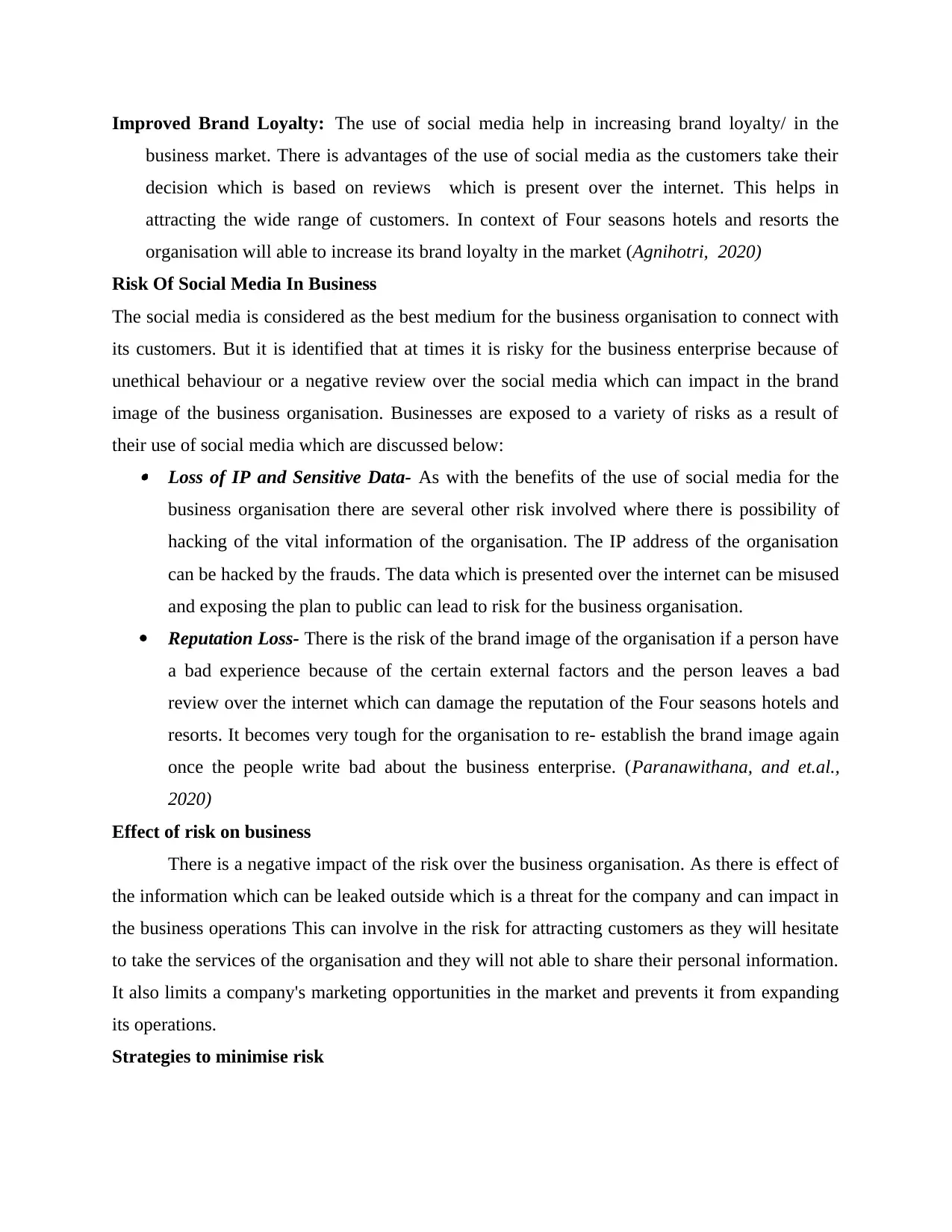
Improved Brand Loyalty: The use of social media help in increasing brand loyalty/ in the
business market. There is advantages of the use of social media as the customers take their
decision which is based on reviews which is present over the internet. This helps in
attracting the wide range of customers. In context of Four seasons hotels and resorts the
organisation will able to increase its brand loyalty in the market (Agnihotri, 2020)
Risk Of Social Media In Business
The social media is considered as the best medium for the business organisation to connect with
its customers. But it is identified that at times it is risky for the business enterprise because of
unethical behaviour or a negative review over the social media which can impact in the brand
image of the business organisation. Businesses are exposed to a variety of risks as a result of
their use of social media which are discussed below: Loss of IP and Sensitive Data- As with the benefits of the use of social media for the
business organisation there are several other risk involved where there is possibility of
hacking of the vital information of the organisation. The IP address of the organisation
can be hacked by the frauds. The data which is presented over the internet can be misused
and exposing the plan to public can lead to risk for the business organisation.
Reputation Loss- There is the risk of the brand image of the organisation if a person have
a bad experience because of the certain external factors and the person leaves a bad
review over the internet which can damage the reputation of the Four seasons hotels and
resorts. It becomes very tough for the organisation to re- establish the brand image again
once the people write bad about the business enterprise. (Paranawithana, and et.al.,
2020)
Effect of risk on business
There is a negative impact of the risk over the business organisation. As there is effect of
the information which can be leaked outside which is a threat for the company and can impact in
the business operations This can involve in the risk for attracting customers as they will hesitate
to take the services of the organisation and they will not able to share their personal information.
It also limits a company's marketing opportunities in the market and prevents it from expanding
its operations.
Strategies to minimise risk
business market. There is advantages of the use of social media as the customers take their
decision which is based on reviews which is present over the internet. This helps in
attracting the wide range of customers. In context of Four seasons hotels and resorts the
organisation will able to increase its brand loyalty in the market (Agnihotri, 2020)
Risk Of Social Media In Business
The social media is considered as the best medium for the business organisation to connect with
its customers. But it is identified that at times it is risky for the business enterprise because of
unethical behaviour or a negative review over the social media which can impact in the brand
image of the business organisation. Businesses are exposed to a variety of risks as a result of
their use of social media which are discussed below: Loss of IP and Sensitive Data- As with the benefits of the use of social media for the
business organisation there are several other risk involved where there is possibility of
hacking of the vital information of the organisation. The IP address of the organisation
can be hacked by the frauds. The data which is presented over the internet can be misused
and exposing the plan to public can lead to risk for the business organisation.
Reputation Loss- There is the risk of the brand image of the organisation if a person have
a bad experience because of the certain external factors and the person leaves a bad
review over the internet which can damage the reputation of the Four seasons hotels and
resorts. It becomes very tough for the organisation to re- establish the brand image again
once the people write bad about the business enterprise. (Paranawithana, and et.al.,
2020)
Effect of risk on business
There is a negative impact of the risk over the business organisation. As there is effect of
the information which can be leaked outside which is a threat for the company and can impact in
the business operations This can involve in the risk for attracting customers as they will hesitate
to take the services of the organisation and they will not able to share their personal information.
It also limits a company's marketing opportunities in the market and prevents it from expanding
its operations.
Strategies to minimise risk
Paraphrase This Document
Need a fresh take? Get an instant paraphrase of this document with our AI Paraphraser
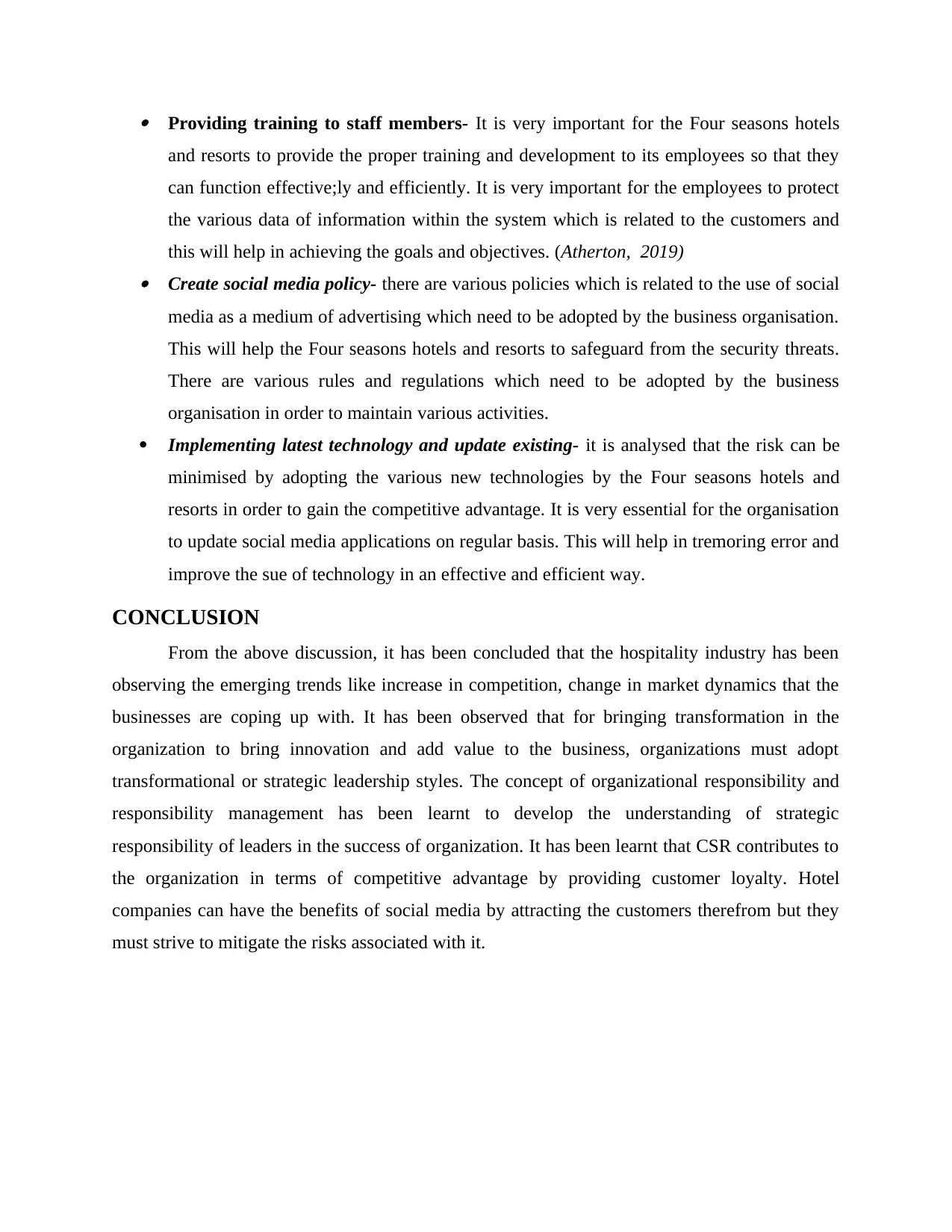
Providing training to staff members- It is very important for the Four seasons hotels
and resorts to provide the proper training and development to its employees so that they
can function effective;ly and efficiently. It is very important for the employees to protect
the various data of information within the system which is related to the customers and
this will help in achieving the goals and objectives. (Atherton, 2019) Create social media policy- there are various policies which is related to the use of social
media as a medium of advertising which need to be adopted by the business organisation.
This will help the Four seasons hotels and resorts to safeguard from the security threats.
There are various rules and regulations which need to be adopted by the business
organisation in order to maintain various activities.
Implementing latest technology and update existing- it is analysed that the risk can be
minimised by adopting the various new technologies by the Four seasons hotels and
resorts in order to gain the competitive advantage. It is very essential for the organisation
to update social media applications on regular basis. This will help in tremoring error and
improve the sue of technology in an effective and efficient way.
CONCLUSION
From the above discussion, it has been concluded that the hospitality industry has been
observing the emerging trends like increase in competition, change in market dynamics that the
businesses are coping up with. It has been observed that for bringing transformation in the
organization to bring innovation and add value to the business, organizations must adopt
transformational or strategic leadership styles. The concept of organizational responsibility and
responsibility management has been learnt to develop the understanding of strategic
responsibility of leaders in the success of organization. It has been learnt that CSR contributes to
the organization in terms of competitive advantage by providing customer loyalty. Hotel
companies can have the benefits of social media by attracting the customers therefrom but they
must strive to mitigate the risks associated with it.
and resorts to provide the proper training and development to its employees so that they
can function effective;ly and efficiently. It is very important for the employees to protect
the various data of information within the system which is related to the customers and
this will help in achieving the goals and objectives. (Atherton, 2019) Create social media policy- there are various policies which is related to the use of social
media as a medium of advertising which need to be adopted by the business organisation.
This will help the Four seasons hotels and resorts to safeguard from the security threats.
There are various rules and regulations which need to be adopted by the business
organisation in order to maintain various activities.
Implementing latest technology and update existing- it is analysed that the risk can be
minimised by adopting the various new technologies by the Four seasons hotels and
resorts in order to gain the competitive advantage. It is very essential for the organisation
to update social media applications on regular basis. This will help in tremoring error and
improve the sue of technology in an effective and efficient way.
CONCLUSION
From the above discussion, it has been concluded that the hospitality industry has been
observing the emerging trends like increase in competition, change in market dynamics that the
businesses are coping up with. It has been observed that for bringing transformation in the
organization to bring innovation and add value to the business, organizations must adopt
transformational or strategic leadership styles. The concept of organizational responsibility and
responsibility management has been learnt to develop the understanding of strategic
responsibility of leaders in the success of organization. It has been learnt that CSR contributes to
the organization in terms of competitive advantage by providing customer loyalty. Hotel
companies can have the benefits of social media by attracting the customers therefrom but they
must strive to mitigate the risks associated with it.

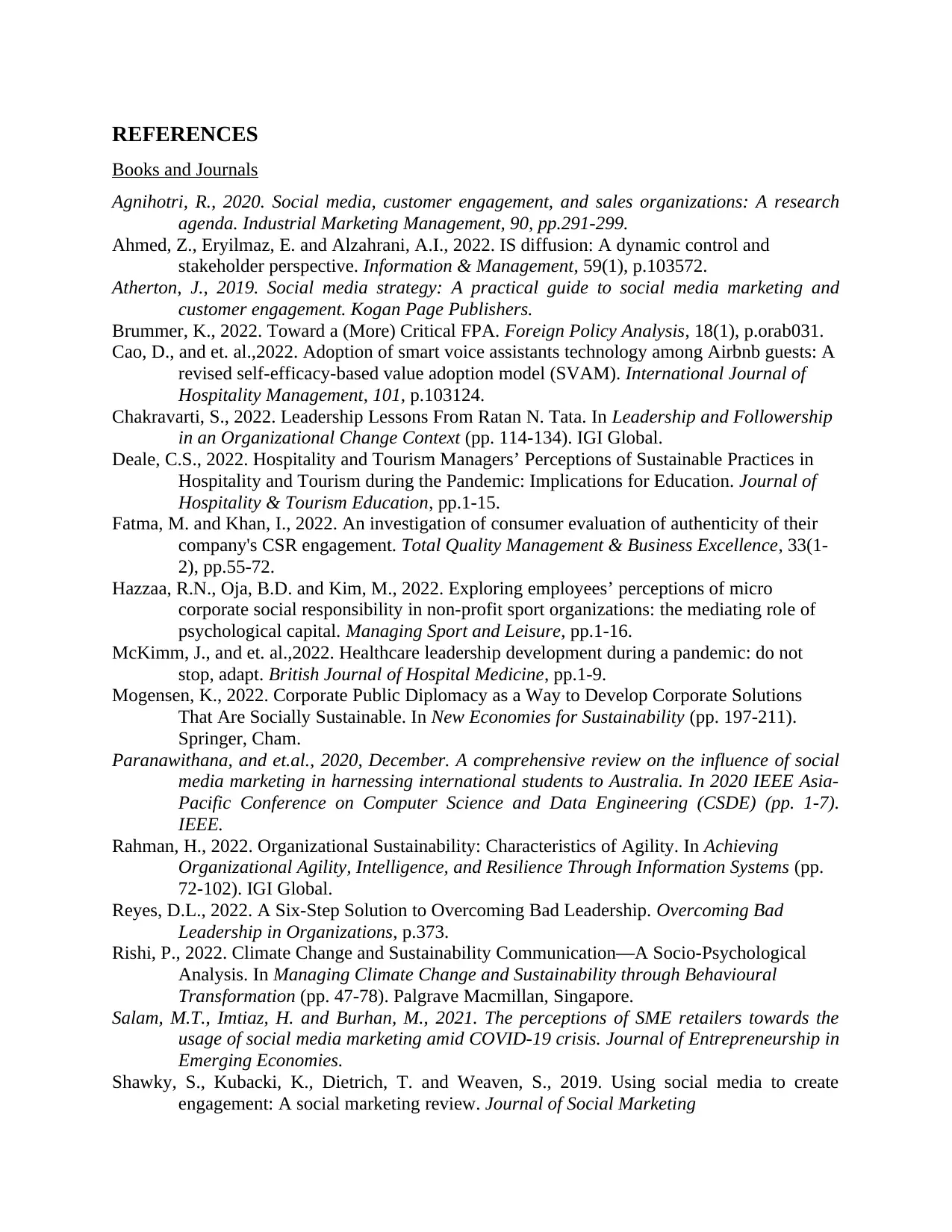
REFERENCES
Books and Journals
Agnihotri, R., 2020. Social media, customer engagement, and sales organizations: A research
agenda. Industrial Marketing Management, 90, pp.291-299.
Ahmed, Z., Eryilmaz, E. and Alzahrani, A.I., 2022. IS diffusion: A dynamic control and
stakeholder perspective. Information & Management, 59(1), p.103572.
Atherton, J., 2019. Social media strategy: A practical guide to social media marketing and
customer engagement. Kogan Page Publishers.
Brummer, K., 2022. Toward a (More) Critical FPA. Foreign Policy Analysis, 18(1), p.orab031.
Cao, D., and et. al.,2022. Adoption of smart voice assistants technology among Airbnb guests: A
revised self-efficacy-based value adoption model (SVAM). International Journal of
Hospitality Management, 101, p.103124.
Chakravarti, S., 2022. Leadership Lessons From Ratan N. Tata. In Leadership and Followership
in an Organizational Change Context (pp. 114-134). IGI Global.
Deale, C.S., 2022. Hospitality and Tourism Managers’ Perceptions of Sustainable Practices in
Hospitality and Tourism during the Pandemic: Implications for Education. Journal of
Hospitality & Tourism Education, pp.1-15.
Fatma, M. and Khan, I., 2022. An investigation of consumer evaluation of authenticity of their
company's CSR engagement. Total Quality Management & Business Excellence, 33(1-
2), pp.55-72.
Hazzaa, R.N., Oja, B.D. and Kim, M., 2022. Exploring employees’ perceptions of micro
corporate social responsibility in non-profit sport organizations: the mediating role of
psychological capital. Managing Sport and Leisure, pp.1-16.
McKimm, J., and et. al.,2022. Healthcare leadership development during a pandemic: do not
stop, adapt. British Journal of Hospital Medicine, pp.1-9.
Mogensen, K., 2022. Corporate Public Diplomacy as a Way to Develop Corporate Solutions
That Are Socially Sustainable. In New Economies for Sustainability (pp. 197-211).
Springer, Cham.
Paranawithana, and et.al., 2020, December. A comprehensive review on the influence of social
media marketing in harnessing international students to Australia. In 2020 IEEE Asia-
Pacific Conference on Computer Science and Data Engineering (CSDE) (pp. 1-7).
IEEE.
Rahman, H., 2022. Organizational Sustainability: Characteristics of Agility. In Achieving
Organizational Agility, Intelligence, and Resilience Through Information Systems (pp.
72-102). IGI Global.
Reyes, D.L., 2022. A Six-Step Solution to Overcoming Bad Leadership. Overcoming Bad
Leadership in Organizations, p.373.
Rishi, P., 2022. Climate Change and Sustainability Communication—A Socio-Psychological
Analysis. In Managing Climate Change and Sustainability through Behavioural
Transformation (pp. 47-78). Palgrave Macmillan, Singapore.
Salam, M.T., Imtiaz, H. and Burhan, M., 2021. The perceptions of SME retailers towards the
usage of social media marketing amid COVID-19 crisis. Journal of Entrepreneurship in
Emerging Economies.
Shawky, S., Kubacki, K., Dietrich, T. and Weaven, S., 2019. Using social media to create
engagement: A social marketing review. Journal of Social Marketing
Books and Journals
Agnihotri, R., 2020. Social media, customer engagement, and sales organizations: A research
agenda. Industrial Marketing Management, 90, pp.291-299.
Ahmed, Z., Eryilmaz, E. and Alzahrani, A.I., 2022. IS diffusion: A dynamic control and
stakeholder perspective. Information & Management, 59(1), p.103572.
Atherton, J., 2019. Social media strategy: A practical guide to social media marketing and
customer engagement. Kogan Page Publishers.
Brummer, K., 2022. Toward a (More) Critical FPA. Foreign Policy Analysis, 18(1), p.orab031.
Cao, D., and et. al.,2022. Adoption of smart voice assistants technology among Airbnb guests: A
revised self-efficacy-based value adoption model (SVAM). International Journal of
Hospitality Management, 101, p.103124.
Chakravarti, S., 2022. Leadership Lessons From Ratan N. Tata. In Leadership and Followership
in an Organizational Change Context (pp. 114-134). IGI Global.
Deale, C.S., 2022. Hospitality and Tourism Managers’ Perceptions of Sustainable Practices in
Hospitality and Tourism during the Pandemic: Implications for Education. Journal of
Hospitality & Tourism Education, pp.1-15.
Fatma, M. and Khan, I., 2022. An investigation of consumer evaluation of authenticity of their
company's CSR engagement. Total Quality Management & Business Excellence, 33(1-
2), pp.55-72.
Hazzaa, R.N., Oja, B.D. and Kim, M., 2022. Exploring employees’ perceptions of micro
corporate social responsibility in non-profit sport organizations: the mediating role of
psychological capital. Managing Sport and Leisure, pp.1-16.
McKimm, J., and et. al.,2022. Healthcare leadership development during a pandemic: do not
stop, adapt. British Journal of Hospital Medicine, pp.1-9.
Mogensen, K., 2022. Corporate Public Diplomacy as a Way to Develop Corporate Solutions
That Are Socially Sustainable. In New Economies for Sustainability (pp. 197-211).
Springer, Cham.
Paranawithana, and et.al., 2020, December. A comprehensive review on the influence of social
media marketing in harnessing international students to Australia. In 2020 IEEE Asia-
Pacific Conference on Computer Science and Data Engineering (CSDE) (pp. 1-7).
IEEE.
Rahman, H., 2022. Organizational Sustainability: Characteristics of Agility. In Achieving
Organizational Agility, Intelligence, and Resilience Through Information Systems (pp.
72-102). IGI Global.
Reyes, D.L., 2022. A Six-Step Solution to Overcoming Bad Leadership. Overcoming Bad
Leadership in Organizations, p.373.
Rishi, P., 2022. Climate Change and Sustainability Communication—A Socio-Psychological
Analysis. In Managing Climate Change and Sustainability through Behavioural
Transformation (pp. 47-78). Palgrave Macmillan, Singapore.
Salam, M.T., Imtiaz, H. and Burhan, M., 2021. The perceptions of SME retailers towards the
usage of social media marketing amid COVID-19 crisis. Journal of Entrepreneurship in
Emerging Economies.
Shawky, S., Kubacki, K., Dietrich, T. and Weaven, S., 2019. Using social media to create
engagement: A social marketing review. Journal of Social Marketing
Secure Best Marks with AI Grader
Need help grading? Try our AI Grader for instant feedback on your assignments.
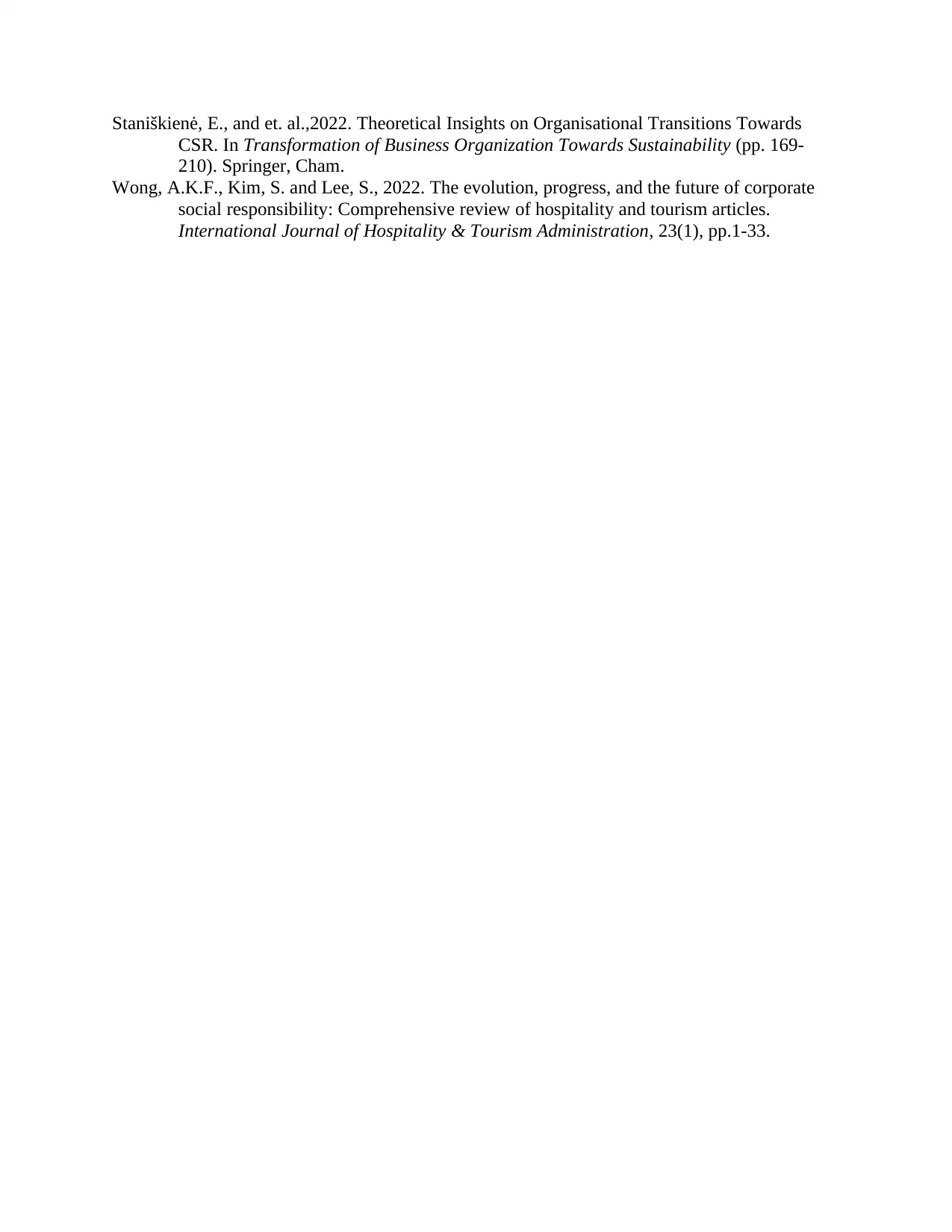
Staniškienė, E., and et. al.,2022. Theoretical Insights on Organisational Transitions Towards
CSR. In Transformation of Business Organization Towards Sustainability (pp. 169-
210). Springer, Cham.
Wong, A.K.F., Kim, S. and Lee, S., 2022. The evolution, progress, and the future of corporate
social responsibility: Comprehensive review of hospitality and tourism articles.
International Journal of Hospitality & Tourism Administration, 23(1), pp.1-33.
CSR. In Transformation of Business Organization Towards Sustainability (pp. 169-
210). Springer, Cham.
Wong, A.K.F., Kim, S. and Lee, S., 2022. The evolution, progress, and the future of corporate
social responsibility: Comprehensive review of hospitality and tourism articles.
International Journal of Hospitality & Tourism Administration, 23(1), pp.1-33.
1 out of 17
Related Documents
Your All-in-One AI-Powered Toolkit for Academic Success.
+13062052269
info@desklib.com
Available 24*7 on WhatsApp / Email
![[object Object]](/_next/static/media/star-bottom.7253800d.svg)
Unlock your academic potential
© 2024 | Zucol Services PVT LTD | All rights reserved.

